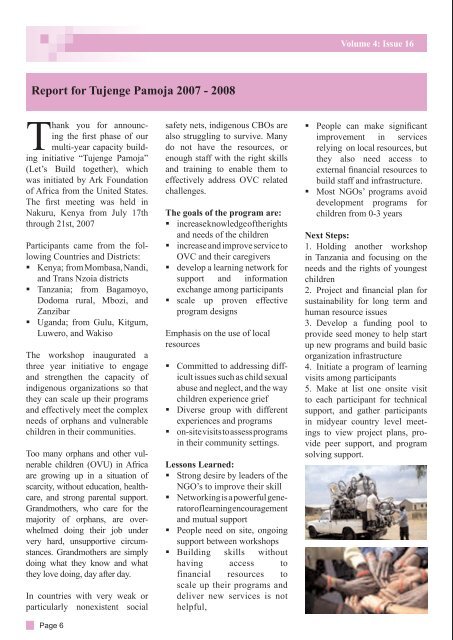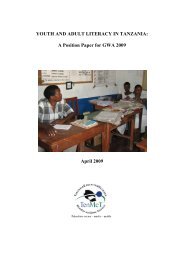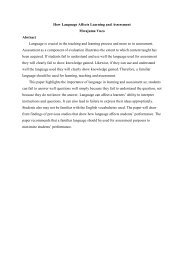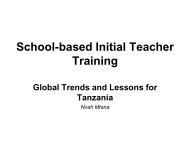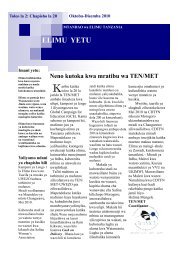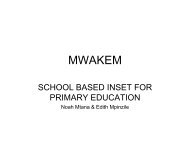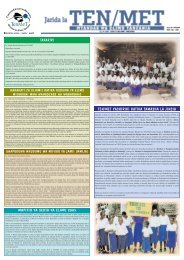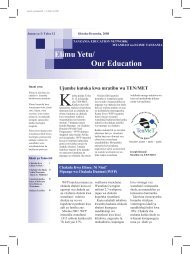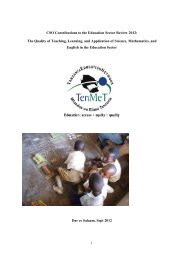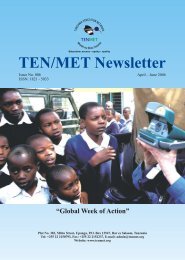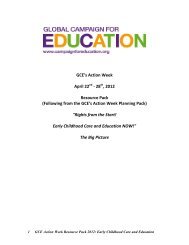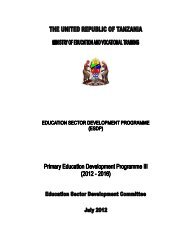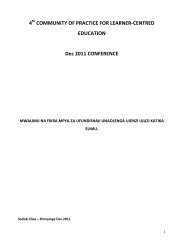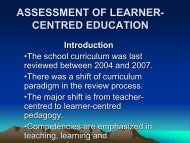Our Education - Tanzania Education Network/Mtandao wa Elimu ...
Our Education - Tanzania Education Network/Mtandao wa Elimu ...
Our Education - Tanzania Education Network/Mtandao wa Elimu ...
You also want an ePaper? Increase the reach of your titles
YUMPU automatically turns print PDFs into web optimized ePapers that Google loves.
Volume 4: Issue 16<br />
Report for Tujenge Pamoja 2007 - 2008<br />
Thank you for announcing<br />
the first phase of our<br />
multi-year capacity building<br />
initiative “Tujenge Pamoja”<br />
(Let’s Build together), which<br />
<strong>wa</strong>s initiated by Ark Foundation<br />
of Africa from the United States.<br />
The first meeting <strong>wa</strong>s held in<br />
Nakuru, Kenya from July 17th<br />
through 21st, 2007<br />
Participants came from the following<br />
Countries and Districts:<br />
• Kenya; from Mombasa, Nandi,<br />
and Trans Nzoia districts<br />
• <strong>Tanzania</strong>; from Bagamoyo,<br />
Dodoma rural, Mbozi, and<br />
Zanzibar<br />
• Uganda; from Gulu, Kitgum,<br />
Luwero, and Wakiso<br />
The workshop inaugurated a<br />
three year initiative to engage<br />
and strengthen the capacity of<br />
indigenous organizations so that<br />
they can scale up their programs<br />
and effectively meet the complex<br />
needs of orphans and vulnerable<br />
children in their communities.<br />
Too many orphans and other vulnerable<br />
children (OVU) in Africa<br />
are growing up in a situation of<br />
scarcity, without education, healthcare,<br />
and strong parental support.<br />
Grandmothers, who care for the<br />
majority of orphans, are overwhelmed<br />
doing their job under<br />
very hard, unsupportive circumstances.<br />
Grandmothers are simply<br />
doing what they know and what<br />
they love doing, day after day.<br />
In countries with very weak or<br />
particularly nonexistent social<br />
Page 6<br />
safety nets, indigenous CBOs are<br />
also struggling to survive. Many<br />
do not have the resources, or<br />
enough staff with the right skills<br />
and training to enable them to<br />
effectively address OVC related<br />
challenges.<br />
The goals of the program are:<br />
• increase knowledge of the rights<br />
and needs of the children<br />
• increase and improve service to<br />
OVC and their caregivers<br />
• develop a learning network for<br />
support and information<br />
exchange among participants<br />
• scale up proven effective<br />
program designs<br />
Emphasis on the use of local<br />
resources<br />
• Committed to addressing difficult<br />
issues such as child sexual<br />
abuse and neglect, and the <strong>wa</strong>y<br />
children experience grief<br />
• Diverse group with different<br />
experiences and programs<br />
• on-site visits to assess programs<br />
in their community settings.<br />
Lessons Learned:<br />
• Strong desire by leaders of the<br />
NGO’s to improve their skill<br />
• <strong>Network</strong>ing is a powerful generator<br />
of learning encouragement<br />
and mutual support<br />
• People need on site, ongoing<br />
support between workshops<br />
• Building skills without<br />
having access to<br />
financial resources to<br />
scale up their programs and<br />
deliver new services is not<br />
helpful,<br />
• People can make significant<br />
improvement in services<br />
relying on local resources, but<br />
they also need access to<br />
external financial resources to<br />
build staff and infrastructure.<br />
• Most NGOs’ programs avoid<br />
development programs for<br />
children from 0-3 years<br />
Next Steps:<br />
1. Holding another workshop<br />
in <strong>Tanzania</strong> and focusing on the<br />
needs and the rights of youngest<br />
children<br />
2. Project and financial plan for<br />
sustainability for long term and<br />
human resource issues<br />
3. Develop a funding pool to<br />
provide seed money to help start<br />
up new programs and build basic<br />
organization infrastructure<br />
4. Initiate a program of learning<br />
visits among participants<br />
5. Make at list one onsite visit<br />
to each participant for technical<br />
support, and gather participants<br />
in midyear country level meetings<br />
to view project plans, provide<br />
peer support, and program<br />
solving support.


